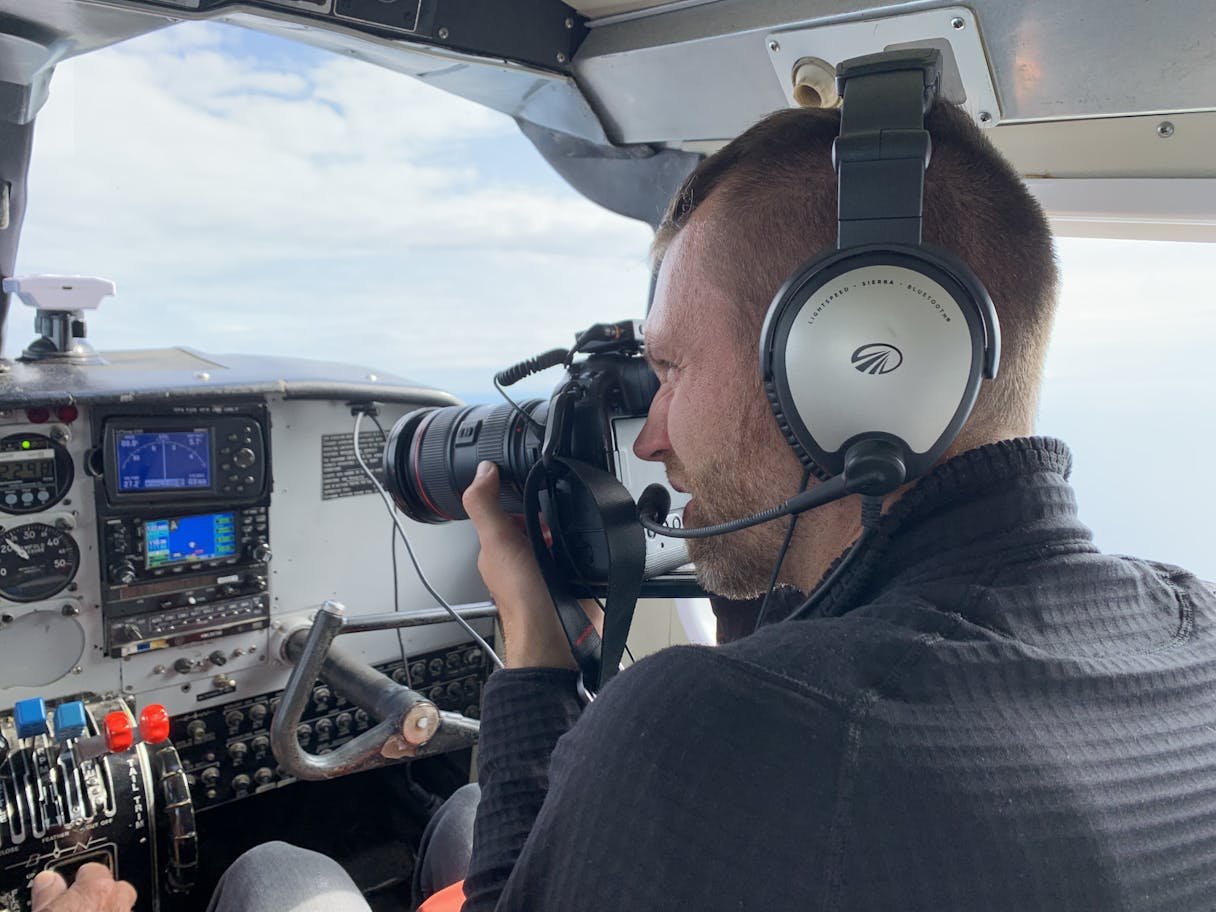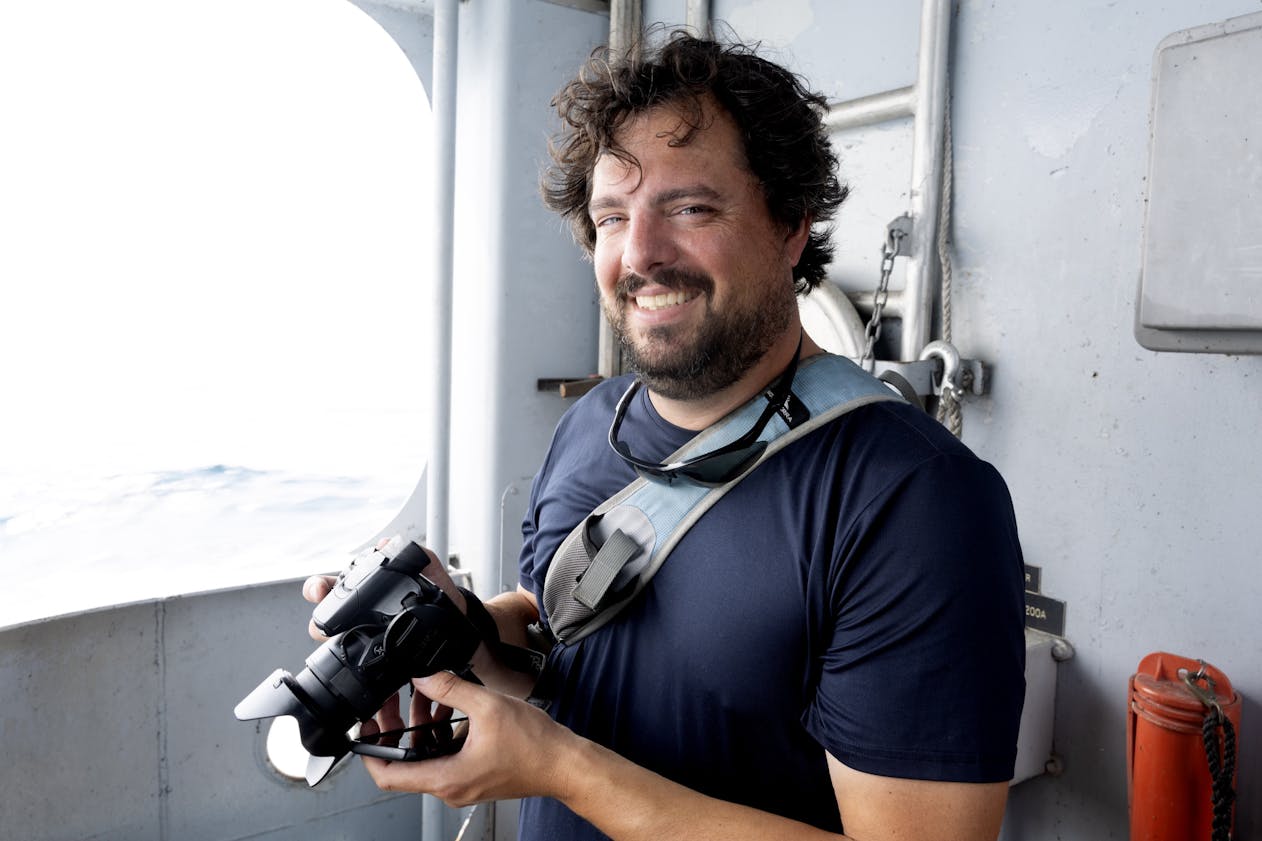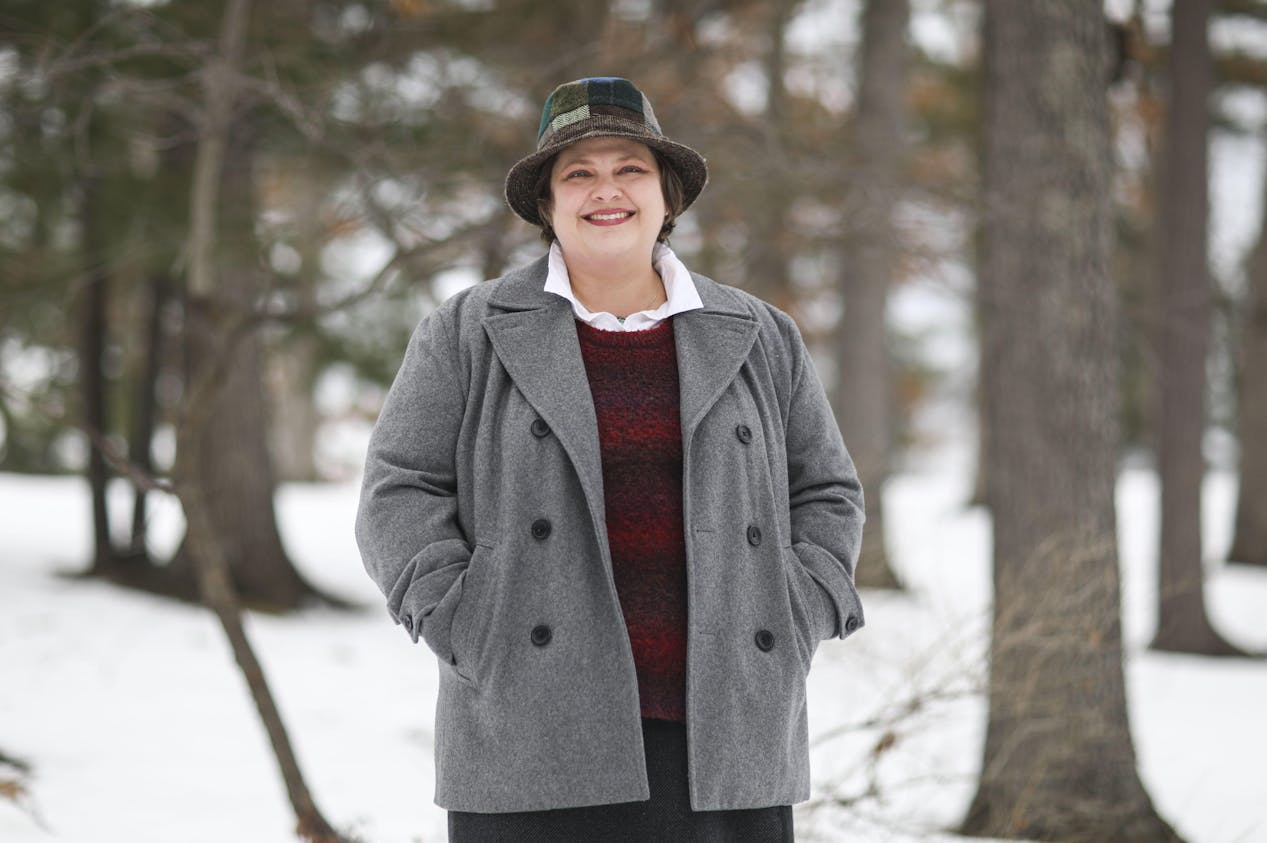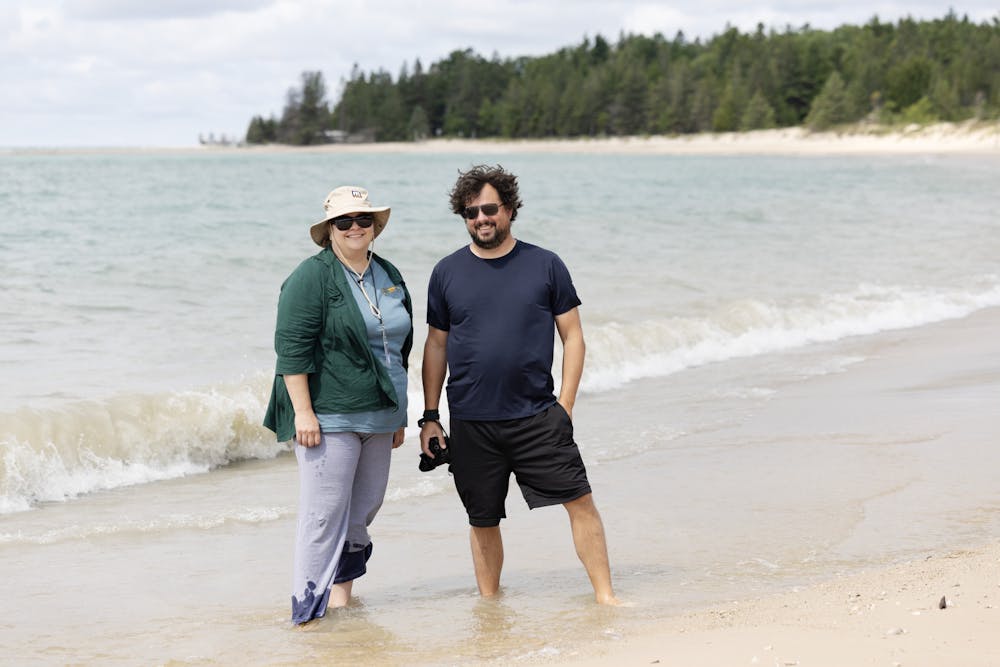'It's always been journalism'
MLive journalists talk about their college years, challenges of the profession
When Neil Blake was flipping through the National Geographic magazine, he wanted to take the same photos from the far places in the world. In high school, Blake learned that he loved photographing people.
Garret Ellison had a similar story: Inspired by National Geographic, he wanted to “be creative and travel.” In high school he fell into the “word side” of journalism.
Sheri McWhirter got “a taste” of journalism on the yearbook team in high school.
“I’ve just never looked back,” she said. “It’s always been journalism.”
Now McWhirter and Ellison, environmental reporters, and Blake, a photojournalist and video producer, are working at MLive.
Environmental reporting
The three of them worked together on a reporting trip to Beaver Island, Michigan. The trio covered the life on the island and the work of the Central Michigan University Biological Station researchers there.

Neil Blake. Courtesy of Sheri McWhirter.
It was not the first time McWhirter and Ellison worked together. Last June they travelled across the Upper Peninsula to tell its stories.
Moreover, McWhirter and Ellison were friends before MLive. They got to know each other at the Institute for Journalism and Natural Resources, a non-profit organization that takes environmental reporters on field trips, McWhirter said.
“I saw the job advertised (at MLive),” McWhirter said. “I called my friend Garret Ellison ... I was worried that he was leaving when I saw advertising an environment reporter job. … He said, ‘no no, this is somebody to come on and be part of the team.’”
McWhirter already had experience in covering the environment and climate change.
When at the Traverse City’s Record Eagle, she covered the Gaylord area, which her editor “considered to be woodsy,” she said.
“He wanted me to keep an eye on the Department of Natural Resources -- what’s going on there with … hunting and fishing,” McWhirter said. “That’s when I realized that I really liked environmental reporting.
“I liked getting out in the woods with the scientists and seeing what they did, and how they figured things out and made decisions about public resources.”
While the environment turned out to be McWhirter’s passion, the general assignments helped her build her expertise and find what she really liked.
“I would ... advise not being afraid to try new things, especially in those early years as a journalist, because I didn’t know that I wanted to be an environmental journalist when I was in college,” she said.
College years
Both Ellison and Blake are CMU and Central Michigan Life graduates of 2009.
Ellison transferred to CMU from Northern Michigan College, located in his hometown of Traverse City. When applying to CM Life, he already been an editor-in-chief at the NMC’s White Pine Press and a freelancer at the Traverse City Record Eagle.
His path into the CM Life newsroom didn’t happen all at once. He first applied to report for the newspaper; however, did not receive assignments that he would have been passionate about, and preferred to freelance at the Record Eagle.
In a year, Ellison returned as a managing editor.
“Don’t get out of college without having built yourself work samples and a portfolio,” Ellison said. “You need to do it while you’re in college. You need to be working at the student paper, you need to be working for the campus radio, you need to be working wherever you can to get experience while you’re in a place in your development that allows the cushion for mistakes and learning.”

Garret Ellison. Courtesy of Neil Blake.
Blake became the first ever videographer at CM Life in 2006. Throughout his years at CM Life, he had various roles in creating visual aspects of the stories.
“The photo classes at CMU taught me how to be a journalist,” Blake said. “CM Life had taught me how to do assignment(s). That’s how I was able to get my first internships.”
Both Ellison and Blake advise young reporters to get experience in their college years. GPA, they say, often doesn’t matter.
“Editors want to see someone who is plug-and-play in the newsroom,” Ellison said. “They don’t want to deal with somebody who needs a lot of coaching.”
McWhirter came to the profession from Southern Illinois University. She joined the college newspaper her sophomore year and stayed there throughout the rest of her college.
One summer she also worked at the college radio station and a jazz station.
“It helped me figure out what I was most comfortable doing and how I felt,” McWhirter said.
Another thing that editors are looking for in young reporters is a journalistic demeanor, meaning curiosity and desire to figure out the story, Blake said.
“Spend time doing meaningful work,” Ellison said. “Find those stories. And when you do find them, take your time to do them.”
After college, coming into the world of journalism was “amazing,” Blake said. It is also easier to focus on work only, rather than balancing “100 different things,” he said.
“I really loved the transition,” Blake said.
Since her college years, McWhirter worked at the newspapers in Illinois, and then later in Northern Michigan such as the Record Eagle, the Petoskey News Review and the Telegram.
McWhirter considered leaving journalism only once when she had “a very negative experience” with an editor. However, she was “rescued by a really great editor at the next job.”
“I would encourage others to not let somebody push you out of journalism if this is what you want to do,” she said.
Looking back at her 20-year career, McWhirter wishes she could tell her younger self “to not let men in positions of power bully me.”
She still remembers her first interview ever with a local politician. When the interview ended, he thanked her, she turned to walk away, and he “patted me on the butt.”
“I was so shocked,” she said. “I wish I could go back and tell myself not to be bullied and pushed around by men in positions of authority, because … only now, two decades into it, have I reached a point where I’m not willing to put up with that anymore.
“And I don’t want young women reporters to go through the same thing. I want you to all stand up for yourselves from the very beginning and don’t let anyone harass or bully you because of your gender.”
Challenges of journalism
Facing challenges like sexism, McWhirter advises journalists to talk with each other and find solidarity.
“There are things changing in journalism where we used to all be in competition with each other all the time,” she said. “It feels like journalists today ... stand in more solidarity with each other, and that’s a good thing. I would say that young journalists should talk about these things with each other. … I wish I would have talked about it with my fellow reporters at the time, but I didn’t.”
Being a journalist is not easy, McWhirter said. Some other challenges are not making a lot of money, working weird hours and sometimes dealing with people who are mad at a reporter.
A lot of journalists, and especially photojournalists at the start of their careers deal with the fear of approaching people, Blake said.
“I can see (fear) in their photos, or I can see it in their stories,” he said.
It stopped Blake from taking photos at his early stages as well.
“You gotta go and introduce yourself and get over this awkward phase and ask some tough questions,” Blake said.
Yet willingness to overcome that fear is an important quality for a journalist, he said. What it takes is practice and “doing it again and again.”
“There’s really no way to get over the fear of anything, other than to face that fear,” Ellison said. “You’re gonna make mistakes. You’re gonna get people pissed off at you. You’re gonna get people who don’t like what you wrote.
“You got to have thick skin, and you got to develop that.”
As journalists' work exists, according to Ellison, "squarely within the public realm," the public will notice if a journalist makes a mistake.
Ellison advises young journalists to learn to accept criticism. Sometimes it provides a beneficial lesson, he said; however, sometimes people just want to argue with a reporter. It takes a while to learn that difference and respond to critics, he said.
The business model of journalism recently broke, Blake said, which also challenged people in the profession. Now journalistic work can be found online for free.
“For a long time, newspapers were hugely profitable from ad dollars … and a really faithful subscriber base,” Blake said. “And (now) we don’t have either of those things.”
This led to fewer and fewer young people going into journalism, he said.
However, with all the challenges, McWhirter still calls reporting “the best job” and loves learning new things.
“It's a great job, and I don't think I would be as good at anything else,” she said.
It is also “the only job that’s absolutely guaranteed by the U.S. Constitution,” she said.
“It was important enough that it was written into the US Constitution that journalists should exist and be allowed to operate independent of government oversight,” McWhirter said.

Sheri McWhirter. Courtesy of Mike Krebs.
What is the importance of journalism?
Journalism is a “matter of checks and balances,” McWhirter said. Journalists hold people in positions of power accountable.
It also provides an accurate news coverage without personal opinions, Blake said.
“It’s important to have your beliefs … and your way of seeing the world,” Blake said. “I think everyone sees the world a little bit differently. It’s really valuable. But I think it only gets dangerous if it influences news coverage.”
For example, today some publications might be leaning more right or left with their coverage to where their readership is, he said.
“I think that’d be dangerous, because then you’re not actually telling your readers what’s happening, you’re just wading into your predisposed disposition,” Blake said. “So it’s another way of saying, everyone gets stuck in their own thought bubble.”
The power of journalism is to “report accurate and truthful information, and give each side a fair representation,” Ellison said.
It is difficult to put your opinion aside and report on something you disagree with, but it is important to give voice to each perspective, he said.
“I think it’s important for a journalist to be able to interview multiple perspectives, present those perspectives,” Ellison said. “Sometimes the thing about journalism and reporting the news is everything is case-by-case. Every story is inherently different, involves different people and different set of facts.”
In the end, the goal of journalists should be to accurately inform people to the best of their ability, he said.
“Journalists are necessary for democracy,” McWhirter said. “If we don’t have journalists, we don’t have democracy.”








